Key takeaways:
- Cybersecurity is essential in telecom due to vast amounts of sensitive data, with innovations like end-to-end encryption key for consumer protection.
- The rise of AI and zero-trust architecture are important trends that enhance real-time threat detection and overall security protocols.
- Regular vulnerability assessments and advanced encryption techniques are critical for telecom providers to maintain customer trust and prevent data breaches.
- Future innovation may involve AI predicting threats and quantum computing transforming encryption methods, highlighting the need for industry collaboration.
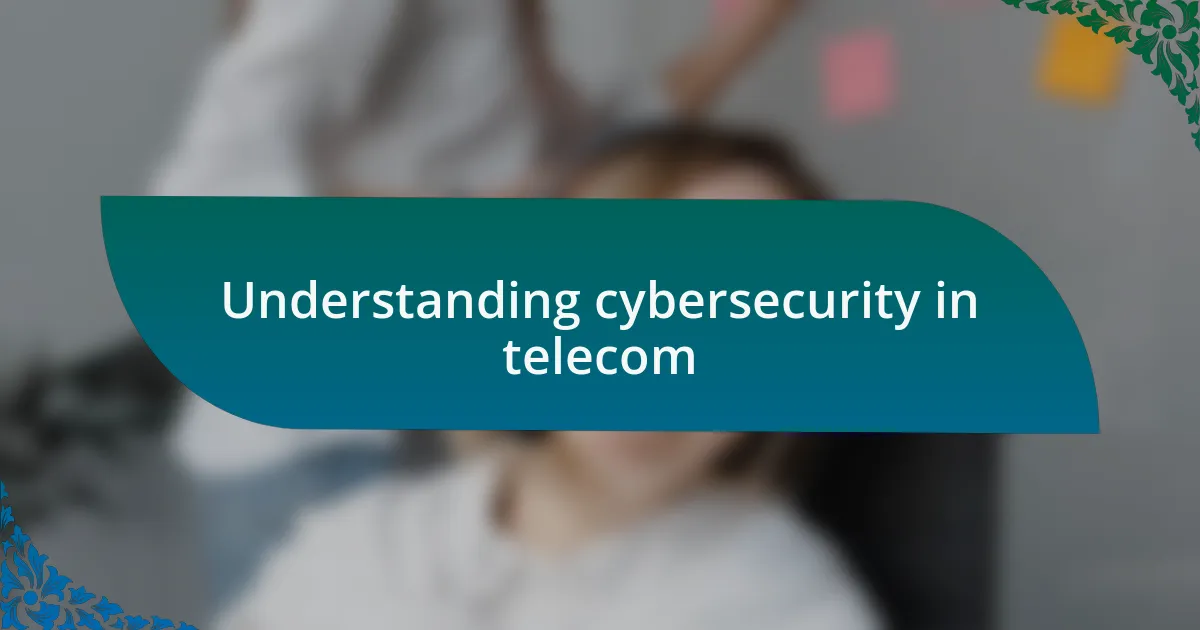
Understanding cybersecurity in telecom
Cybersecurity in the telecom industry is crucial because these companies often manage vast amounts of sensitive data. From my experience, I’ve seen firsthand how even a small breach can lead to significant reputational damage and financial loss. Have you ever considered how much personal information we unknowingly share with telecom providers?
One moment that stands out to me was during a conference focused on telecom security innovations. A speaker highlighted the importance of end-to-end encryption for securing communications, and it struck me how many people overlook this. It makes me wonder: are we as consumers doing enough to protect our own data, or are we trusting that the telecom giants have our best interests at heart?
As telecom technologies evolve, so do the threats. I remember discussing with a colleague how the rise of IoT devices creates a greater attack surface for cybercriminals. This made me ponder: with the convenience these innovations bring, are we fully aware of the risks lurking behind them? Understanding cybersecurity not only benefits the companies but also empowers us—consumers—to make safer choices.
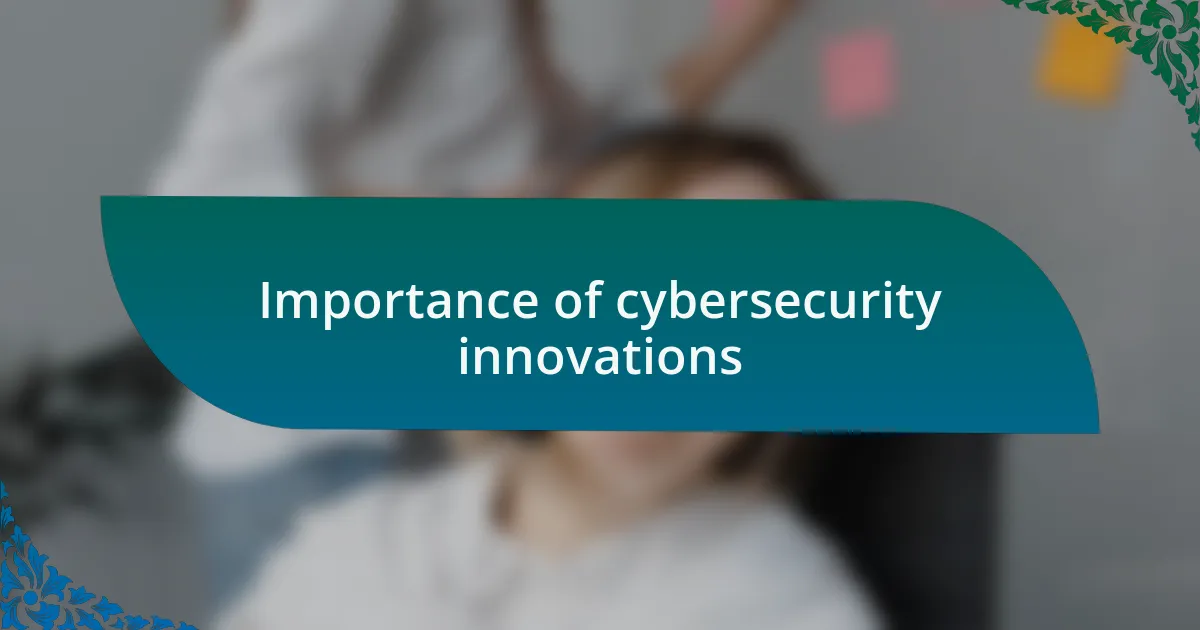
Importance of cybersecurity innovations
Innovations in cybersecurity are vital because they directly address the evolving tactics of cybercriminals. I remember attending a workshop on advanced threat detection technologies, where experts shared alarming statistics about increasing cyber threats in the telecom sector. It really drove home the point that without constant innovation, our defenses can quickly become obsolete. Have you thought about how often new vulnerabilities are discovered?
Furthermore, these innovations don’t just protect telecom companies; they safeguard consumers like you and me. I once received a call from a friend whose identity was stolen after a data breach at their service provider. It was a stark reminder of how interconnected we are and how crucial cybersecurity advancements are in preventing such incidents. How often do we consider that our personal safety is tied to the investments companies make in their cybersecurity strategies?
Finally, the importance of cybersecurity innovations extends to building consumer trust. I recall a discussion I had with a telecom executive who emphasized that when companies prioritize cybersecurity, it reassures customers and enhances loyalty. This made me reflect: how much does a customer’s sense of safety impact their choice of service provider? As technology evolves, innovations in cybersecurity will be the backbone of sustainable telecom growth, ensuring that trust between consumers and providers remains intact.
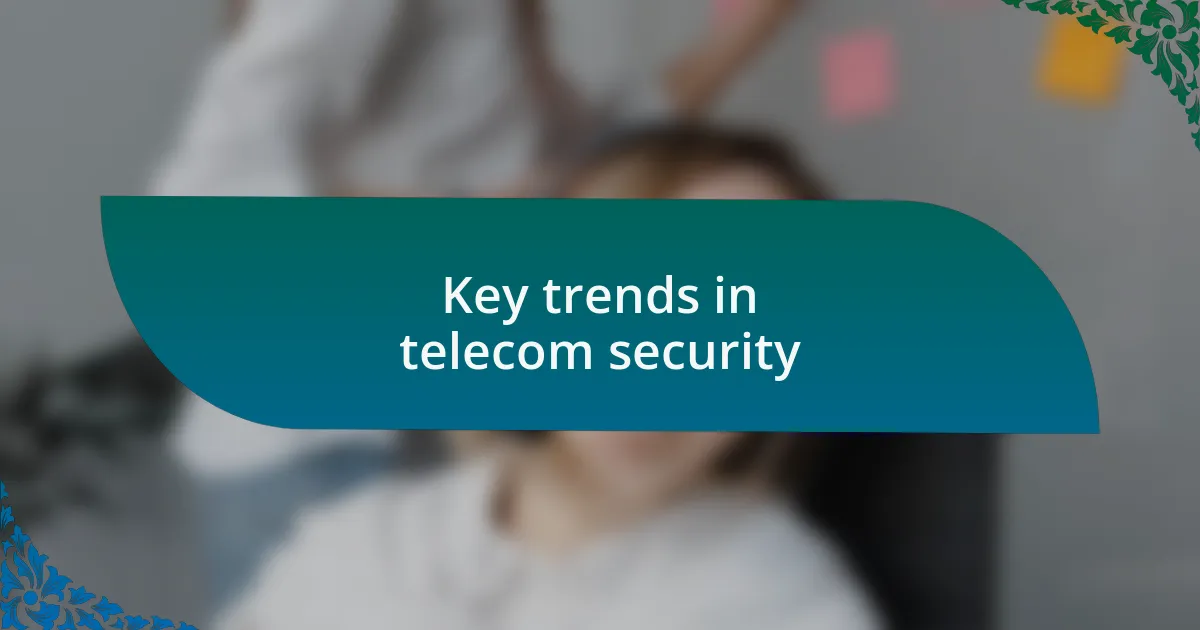
Key trends in telecom security
The rise of artificial intelligence (AI) in telecom security is a significant trend that’s hard to overlook. I recently came across a case study where AI was utilized to analyze network traffic, allowing for real-time detection of anomalies. It struck me how powerful such technology could be—AI not only speeds up response times but also reduces the burden on human analysts. Have you considered how quickly cyber threats evolve, and how crucial it is to have a system that can adapt just as fast?
Another trend shaping the landscape of telecom security is the emphasis on zero-trust architecture. I still remember discussing this approach with a colleague who works in mobile network management. He passionately described how treating every device and user as a potential threat could change the game for security protocols. It made me think: if companies can create a culture of skepticism and vigilance, wouldn’t that significantly lower the risk of breaches?
Moreover, the implementation of advanced encryption techniques is gaining traction. Just the other day, I chatted with a friend who works at a data center, and he spoke about how end-to-end encryption is becoming standard practice. It’s comforting to know that significant strides are being taken to protect our communications. I can’t help but wonder: as these technologies evolve, will our confidence in telecom security grow along with them?
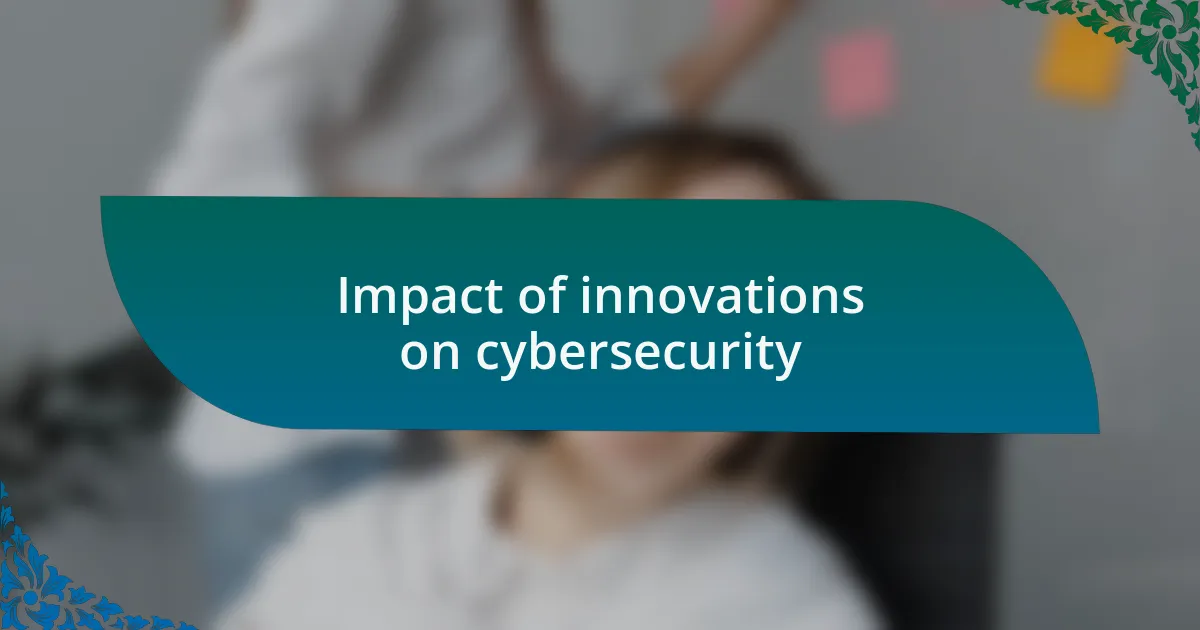
Impact of innovations on cybersecurity
Innovations in cybersecurity have fundamentally transformed the ways we protect digital infrastructure. I recall a moment during a cybersecurity workshop when a speaker highlighted the role of blockchain technology in enhancing data integrity. It struck a chord with me; the prospect of using a decentralized ledger to make tampering nearly impossible is fascinating. Have you ever considered how trust in our data can be significantly bolstered through such innovative approaches?
The integration of machine learning in threat detection is another impactful innovation I’ve encountered. A few months ago, I attended a tech conference where experts showcased algorithms that can learn from new attack patterns. The excitement in the room was palpable when they discussed how these systems not only identify threats but also predict them. This ability to anticipate cyber incidents feels like having a security guard who’s always one step ahead—doesn’t that change the game for businesses?
Additionally, I find the advancements in multi-factor authentication (MFA) to be a game-changer for user security. I remember my initial skepticism when my bank introduced biometric login options, thinking it was just a gimmick. But now, after experiencing the layer of security it provides, I appreciate how such innovations raise the bar for securing user accounts. Can you imagine a world where accessing your accounts is not only easier but also inherently safer?

Personal thoughts on recent developments
I’ve been closely observing the rise of Zero Trust architecture in recent cybersecurity frameworks. When I first learned about this model, I was intrigued by its principle of never automatically trusting anything inside or outside the network. This idea instantly resonated with me, reminding me of a time when I felt betrayed during a data breach incident at a former job. It made me realize how crucial it is to verify every access request—because trust can often lead to vulnerabilities.
Moreover, I believe the focus on user education in cybersecurity innovations is an exciting development. Recently, I took part in an interactive training session that emphasized recognizing phishing scams. I was genuinely impressed by how engaged everyone was, as it became apparent that knowledge is indeed power. Have you ever felt a slight chill when you received a suspicious email? Knowing how to spot these threats can be the difference between security and a severe breach.
Lastly, the deployment of quantum encryption is something I find profoundly promising. Although it feels like a technology straight out of science fiction, the potential it has to revolutionize data security is exhilarating. I vividly remember discussing this topic with a friend who works in encryption; his eyes lit up as he articulated the way this innovation could make eavesdropping virtually impossible. Can you imagine a future where our most sensitive information is safeguarded by the laws of quantum physics?

Practical steps for telecom providers
Telecom providers must prioritize regular vulnerability assessments to stay ahead of potential threats. I remember a time when a minor oversight in system security led to a significant data leak in my previous workplace; it became painfully clear how crucial it is to identify weaknesses before they can be exploited. Engaging with third-party security experts can provide a fresh perspective and uncover issues that internal teams might overlook.
Implementing advanced encryption techniques for customer data is another vital step. During a recent discussion with a colleague about data protection strategies, we realized how often encryption is either neglected or implemented poorly. The anxiety that comes with not securing sensitive information can be overwhelming, so telecom providers should adopt robust encryption protocols to ensure customer trust and confidence in their services.
Lastly, fostering a culture of cybersecurity among employees can make a remarkable difference. I recall participating in a team-building exercise focused on security; the camaraderie created not only boosted morale but also increased awareness about best practices. Have you ever noticed how a shared commitment can lead to stronger defenses? Encouraging open dialogue about security issues and making it a core value of the company can inspire employees to take proactive steps in protecting their network.
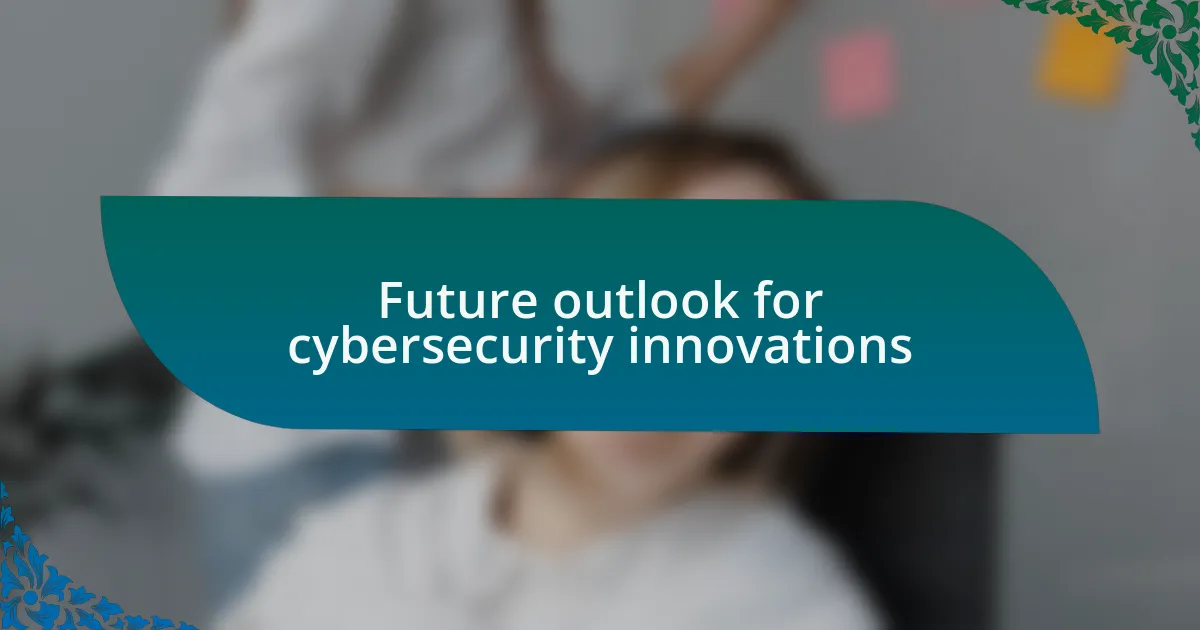
Future outlook for cybersecurity innovations
As we look toward the future of cybersecurity innovations, I can’t help but feel a mix of excitement and caution. Imagine a world where artificial intelligence not only detects but also predicts cyber threats in real-time. Just the other day, I was discussing with a tech-savvy friend how AI-driven analytics could transform the way we approach security. The thought of machines learning from previous attacks to create proactive defenses fills me with hope for a safer digital environment.
Another innovation on the horizon is the expansion of quantum computing in cybersecurity. This technology has the potential to revolutionize encryption methods and render traditional security measures obsolete. I remember when I first heard about quantum encryption at a conference; the idea that hackers could be outsmarted by the very principles of quantum mechanics seemed almost too good to be true. Have you ever considered how this might influence our day-to-day communication? The possibilities are endless.
Lastly, the future might also see greater collaboration among telecom providers and cybersecurity firms. Reflecting on my own experiences with industry partnerships, I saw firsthand how sharing information can significantly enhance security measures. This collaborative approach could lead to the development of standardized protocols that make it harder for cybercriminals to exploit vulnerabilities. Doesn’t it seem like a united front could create a more resilient defense? Together, we can build a stronger cybersecurity framework that benefits not just individual companies, but the entire telecom ecosystem.